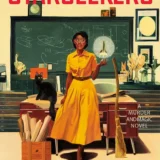Yes, I’m old enough to remember “Schoolhouse Rock” and that ditty, along with “Conjunction Junction,” still is taking up storage space for reasons I’m not 100% sure of. But I agree with creator David McCall that three is indeed a magic number. Trilogies have a long-standing tradition in fantasy literature. While discussing why that is would be an interesting post in its own right, today I’m going to shift the discussion, as I’m often known to do, toward publishing from the author’s perspective.
It’s darn hard, and almost impossible unless you really catch lightning in a bottle, to be successful with just one book released. And yet I see author after author making the big mistake of getting their first book out and spending way too much time trying to get people to read it. I understand the temptation. You’ve spent months, maybe years writing something that you think is a masterpiece and now you want to get others to know about it so it just doesn’t fade into obscurity. But I’m going to suggest that you’ll want to curb that impulse.
All writers, have only so many hours in the day, and most have day jobs which makes matters even worse. Marketing (if done correctly) is very time-consuming and at least when you are unknown is pretty much done “by hand” as there really aren’t any shortcuts. The problem is once you get that reader to look at your book…and lets say they really love it…then what. They have nothing else from you so they will move on to someone else. Months, or years later, when you get your second book out, they may not even remember the first.
The MOST IMPORTANT thing you can do after finishing your first book is to write your second. In fact, I feel the same way about the second to the third. Generally I recommend the following writing/promotion break down for new authors:
- 1 book released: 95% writing next book / 5% promoting book #1
- 2 books released: 90% writing next book / 10% promoting books #1 & #2
- 3 books released: 50% writing next book / 50% promoting the three book
What you do during the 5% – 10% should be primarily focused on getting reviews. This may mean contacting book blockers, sending personal messages to people on goodreads, or sending out review copies to Amazon top reviewers. It’s okay to let those books just “sit there” and percolate – on their own. What you should be shooting for is to have at least 10 reviews on each book (and preferably 25 on the first and at least 15 on the second) by the time book #3 is done.
Once the third book comes out…THEN is the time to start doing some serious promoting. Now you have a “body of work” such that if you get people interested in the first one, then they have more of your work to pick up.
So do you keep doing 50%/50% indefinitely? Not at all. Ideally you want to shift that back to 80%/20% and if you ever become a “true name brand” then you can scale back to a point where all you are doing is interacting with existing fans rather than courting new ones. The shift occurs as you start seeing momentum independent of your own efforts. Once you see your books being talked about in forums, or on goodreads from people who you have never spoken with personally, then you know that word-of-mouth is picking up. Now that you have an army of readers out there promoting on your behalf, your responsibility is to produce more content for them to gobble up. Each new book will spur the sales of those that came before, so you’ll get new income not only from the new release, but from renewed interest in the previous works.
I know to some writers, even the thought of spending 5% or 10% on marketing is repulsive…but the fact is, marketing departments are over burdened and only YOU are 100% interested in ONLY your books. If you don’t plan on helping your books find an audience, then don’t be disappointed when they fail miserably because although they may be good, no one knew they existed.
Michael J. Sullivan is a speculative fiction writer who has written twenty-five novels and released nine. Eight of his fantasy books (The Riyria Revelations, and The Riyria Chronicles), were published by Hachette Book Group’s Orbit imprint. Hollow World, a science-fiction thriller was released by Tachyon Publications. The first four books of his new series, The First Empire, has sold to Random House’s Del Rey imprint, and the first book is scheduled to be released in the summer of 2016. He can be found on twitter, through his blog www.riyria.com, and on his facebook page and his publisher’s page for the series.









Good points and very interesting insight.
Michael:
I wasn't aware of the "three book" concept. My book contracts (mostly non-fiction) have always been for a single book with an option on a second. In any case, since it took me 30 years to finish my first novel, a three book contract might require my vampirization to complete the contact terms.
Geoffrey
Yeah non-fiction is going to be a single book contract, but for fantasy and science fiction – those publishers want 3.
I have a very similar – yet different 'take' on the issue of THREES and have to thank you for bringing this up. Similar? When it comes to collecting, you often hear: "Buy one and it's chance. Buy a second – and it's a coincidence. Buy the third – and you're a collector!" Which provides the seque to what I believe is 'different'. And that is, a very deep – cultural bias – towards "threes". I wrote on this for my PhD thesis in linguistics. Doesn't matter whether it's the 3 bears, the 3 fates, the 3 wishes, or the three novels. Trios, and therefore trilogies have a long (and magical) history in Western culture – so it's good advice to plan on them 🙂 But I also learned: this is NOT a universal theme/schema. For native Americans, it likely would be FOUR novels to seem complete, and for the Indian sub-continent/East it would be FIVE. Something to bear in mind, eh? Not all good things come in threes, though it may very well sound like that, and indeed BE like that, to us here in our tiny part of the universe.
Michael, thanks for the insight. I agree with you. I've talked to multiple people who I trust in the industry and they always talk in three. They say that it takes three books on the shelf to sell one book. Even more they talk about the spiral of death. Your first book the store puts three books on the shelf. The second book unless the first sold really well they buy two. The third book they buy one. You guessed it the fourth book they buy zero. That is why you see so many authors with only three books out. They got the 3 book deal and didn't sell. Then they can't force their way back on the shelf. Some authors have even given in to changing their pen name.
I like your strategy for self publishing. Readers like to see that the author has more to offer than just a quick hit and run before they invest their time and money.
Thanks,
RKT
You are welcome, I'm glad you enjoyed the post.
I'm going to disagree with you on this one. My observation is that, in general, the most successful authors (artists, musicians, etc.) don't just spend plenty of time promoting their work, they actually enjoy that aspect of the job.
I don't think I said anywhere that you can't enjoy promoting…so that is not a point of disagreement. I enjoy doing a lot of things….but I still have to get my writing done first. if you write, say 1,000 – 2,000 words a day toward your novel, and have time on your hands…then by all means do whatever you wish with that extra time…do promotions, play video games, go for a bike ride, watch television…My only point was that until you reach 3 released books your writing time should be dedicated to writing the next book as your highest priority.
One problem with this. If you don't sell enough copies of the first book, the publisher won't buy your second.
The days when a publisher would allow an author to build an audience are long past.
In genre fiction, most contracts are three book deals…so you already are under a deadline for #2 and #3. So for traditional authors this is even more important. I've yet to meet an author with a 1 book deal. I was primarily talking about self-published authors who are in control of what is released ad when.